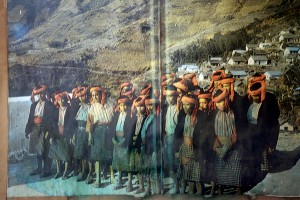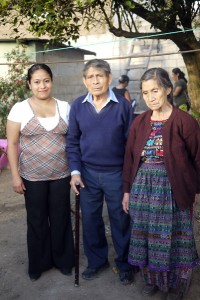PANAJACHEL–People are often surprised to learn that the Mayans are still a vital culture, with their own languages, customs, religion and communities. It may have been a long time since they built any pyramids but the Maya are, if pressed by hundreds of years of Spanish conquest, forced assimilation, frequent massacres and the unstoppable encroachment of the modern world, still possessed of strong traditions and close-knit communities. Guatemala is the Mayan heartland, though their culture covered what is now Mexico’s southern States of Yucatan and Chiapas, Belize and parts of Honduras and El Salvador. Unlike the Imperial Aztecs to the north and the Inca far to the south, the great Mayan cities were abandoned by the time the Spaniards arrived. No one knows exactly why the Mayan high civilizations fell, though it is likely due to a combination of endemic warfare between the rival City States of the different tribes and environmental pressures. Although the great cities, like Tikal, were already reclaimed by the jungle when the conquistadors arrived, the Spanish still encountered fierce resistance. As they did throughout the Americas they pitted one side against the other, employed native mercenaries and made full use of their superior military technology and experience.

Kachiquel Mayan men from San Antonio Palopó. This reproduction of a hand colored photo, which I found pinned to a wall in that town, was probably taken in the early 20th century. The traditional clothing in this image is still woven by hand and worn today.
Some of the bloodiest battles were fought in the Atitlan region between the Kachiquel and Tzutuhuile tribal groups who are still heavily represented in the towns around the lake as well as the Quiché. The Quiché have a small lakeside presence but their homeland is in the mountains north of the Atitlan/Solola region. Many people to this day speak either Kachiquel or Tzuthuile, some exclusively, though most know Spanish as well.
I acquired this basic Kachiquel lexicon from my Spanish teacher, Holga Yolanda, from the town of Patanatic (a pueblo on the mountain overlooking Panajachel) and from a boy named Marco who sold scarves and other textiles on the street. Marco was from Santa Catarina Palopó, a pueblo on the lakeshore, about four kilometers from Panajachel. I cross-checked the words between the two sources and tried many of them out on random locals with whom I would stop to chat. In such I was generally successful in making myself understood. The phonetic spellings of the Mayan words are of my own device as are any and all errors. As for the collection of phrases I generally let the sources tell me what they wished to and, therefore, what to them seemed important.
Good morning//The sun rises/Buenos Dias: “Zaca-rikâ€
Good afternoon/Buenos tardes: “Sha’ka-iirâ€
Good evening/The night comes on/Buenos noches: “Xoc-ak’aâ€
Until tomorrow/Hasta mañana: “Chuac cheekâ€
Goodbye/Adios: “Ki-banaâ€
I am going home/Yo voy a mi casa: “Yin-eeah chi wa chochâ€
Midday/Medio dia: “Pan-kaj kijâ€
How are you?/Como estas?: “Utz a-wach?â€
I am well, thank-you/estoy bien, gracias: “Utz matioshâ€
What is your name?/Como te llama?: “Ach-ka a bee?â€
What is your name (formal)/Como se llama usted?: A-chi-ka abi-riet?â€
My name is Andrew/Me llama Andres: “Ri-en nu be, Andres
I/yo: “yinâ€
Please/Por favor: “Tah-ahna utishâ€
What time is it?/Que hora es?: “Achi-ka-ora?â€
To want/querer: “Na-wa-hoâ€
You drink beer/Tu tomes cerveza: “Yet-ya tiho-yaâ€
I want a beer/Yo quiero cerveza: “Yin wa ho yaâ€
To eat/comer: “Natigâ€
To drink/Tomer: “Na-cunâ€
To smell/oler: “Na zakâ€
Tasty!/Rico!: “Qui!â€
Acidy, bitter/Asido, amargo: “Chámâ€
Spicy/Pica: “Pókonâ€
Money/Dinero: “Pókâ€
Meat/Carne: “ti-Ãrrâ€
Beer/Cerveza: “Yaâ€
I want to eat/Yo quiero comer: “Yin nuah-ho yee wahâ€
Do you smoke?/Tu fumes?: “Yet ya-si kan?â€
How old are you?/Quanto de años tiene?: “Yet-hani-a-hunah?â€
Where are you going?/De donde vienes?: “Achi-kapeweh?â€
Do you have brothers?/Tienes hermanos?: “Ye-ehko-acha?â€
Wife/Esposa: “Wash-ai-eehâ€

2 Comments